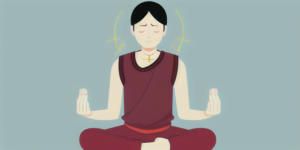On the broad canvas of our shared existence, we are often compelled by an innate curiosity to explore and understand the world around us. This human instinct shapes our identities, influences our perceptions, and inspires our actions. However, the very faculties that drive our understanding can also lead us astray, drawing us into a vortex of judgment and division. We find ourselves tangled in the labyrinth of our own thoughts and opinions, which rather than serving as a conduit for understanding, often turns into a drain for our vital energies. This discourse seeks to illuminate this human predicament, guiding you towards a higher realm of consciousness and self-awareness.
Let us first address the essence of our intellectual mind. The capacity to judge, compare, and discriminate lies at the heart of human cognition. We discern between light and dark, between sweet and bitter, between laughter and tears. We separate objects from each other, concepts from concepts, and individuals from individuals. This capacity is vital; it helps us make sense of the world and forms the foundation of our knowledge. However, we must acknowledge the duality of this faculty. In as much as it aids in our understanding of the world, it also poses the risk of unnecessary division, of creating an illusion of separateness in what is essentially a unified reality.
Our temptation to judge and give opinions on everything often stems from a desire to assert our intellectual superiority, to satisfy our ego. We become critics of the world, providing unsolicited opinions about the affairs of others, about issues that bear no direct relevance to us. We scrutinize the lives of others, passing judgments and making assumptions based on limited knowledge. We assert our opinions with an air of self-righteousness, convinced that our understanding is supreme. And in this grand charade, we expend precious mental energy, draining ourselves in the process.
The incessant judgments and opinions we form are often colored with negativity. We find fault in others, critique their actions, and harbor expectations about their behavior. We get embroiled in debates, eager to prove our intellectual prowess, without realizing that this constant engagement does not enrich us, but rather saps our energies. We expend our mental faculties in creating division, in proving ourselves right, in winning arguments, not realizing that all the while we are losing something far more valuable – our peace of mind.
Let us take a moment to visualize a stream. It flows naturally, unimpeded by the stones and debris in its path. It does not judge the obstacles nor form opinions about them; it merely flows around them, carrying on its journey. It does not separate the water molecules, claiming one to be superior or inferior; instead, it accepts them all as a part of itself. This is the lesson we must learn. Life is a flow, a stream of experiences, where everything is interconnected and one.
The beauty of a garden lies not in the individual flowers but in their collective beauty. Each flower is unique, contributing its own fragrance and color to the garden, yet they exist together in harmony, creating a beautiful spectacle. This is how we must view the world, recognizing and respecting the uniqueness of each entity yet acknowledging their interconnectedness.
The practice of self-awareness can help us break free from the shackles of judgment and division. By cultivating awareness, we can recognize the triggers that lead us into these futile mental constructs and gradually disengage ourselves. We need to harness our mental energies for self-improvement, for self-awareness, for introspection rather than wasting it on unnecessary criticism and division.
A time-honored tool in this journey towards self-awareness is meditation. It is through silence and stillness that we can listen to the whispers of our soul, discern the true nature of our thoughts, and detach ourselves from the ego-driven need to judge and opine. It is through meditation that we can cultivate mindfulness, allowing us to live in the present moment, accepting it for what it is, without the need to dissect or analyze it.
We must remember that our judgments and opinions do not define the world; they only reflect our perception of it. By letting go of these, we not only conserve our mental energy but also free ourselves from the confines of our own thoughts. We start seeing the world as it is, not as we want it to be. We learn to appreciate the unity in diversity, the harmony in chaos, the silence in noise.
We must acknowledge our temptation to judge and divide as an inherent part of our human nature, but we should also strive to rise above it. We need to recognize that our intellectual mind, while an essential tool for understanding the world, can also lead us into unnecessary division and drain our energies. By cultivating self-awareness and practicing mindfulness, we can direct these energies towards a higher purpose, towards realizing the oneness in all of existence and achieving a state of inner peace and tranquility. As we walk this path, we can hope to witness a world not fragmented by judgments and divisions, but united in its beautiful diversity.





